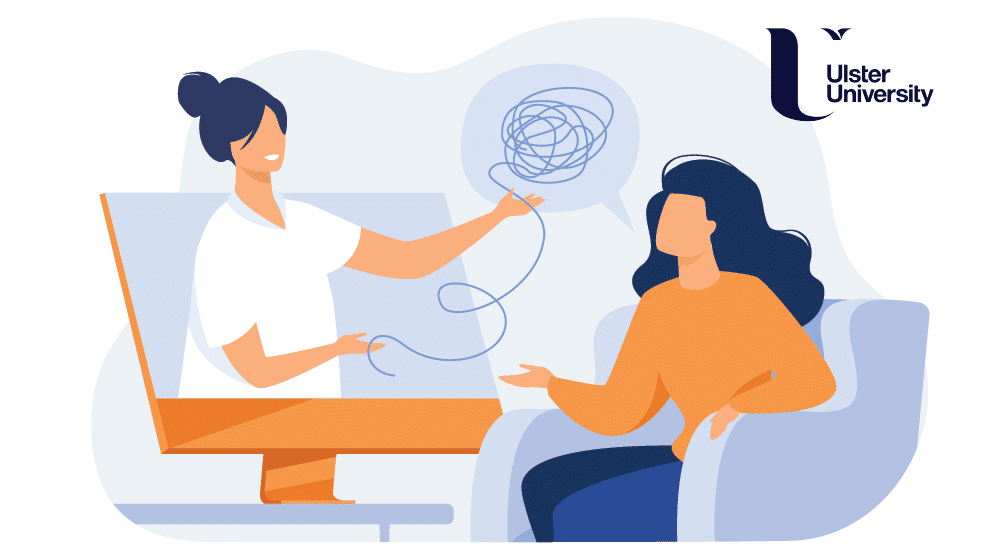Blogs
Keep up with all the latest thoughts and opinions.
We make it happen.
What can I do with an MSc Psychology degree?
Monday, August 7th, 2023

What jobs can you do with a BPS-accredited Psychology Conversion MSc?
With an accredited psychology qualification, you’ll be well placed to forge a successful and thriving career, and, in a field that’s continually expanding, there’s an ever-widening range of roles available to qualified Psychology Masters graduates.
So, if you’re looking to move into this dynamic area, it’s important you know about the different specialisms, the psychology career paths available, the skills and qualifications needed, and the earning potential for each role. In this article, we’ll breakdown the top psychology careers in more depth.
Psychology career paths in the UK
Graduates with an accredited psychology degree can progress to work in roles including (but not limited to):
- Clinical Psychologist
- Educational Psychologist
- Forensic Psychologist
- Health Psychologist
- Occupational Psychologist
- Sports Psychologist
To kickstart your psychology career, it’s essential that you have a qualification accredited by the British Psychological Society (BPS). By completing an accredited course, you’ll be eligible for Graduate Basis for Chartered Membership (GBC) status, which is fundamental for continuing your studies so you can specialise and work in one of the areas listed above.
For many people, this is obtained by studying a relevant undergraduate degree. However, if you did not study psychology at an undergraduate level, or your qualification was not accredited, you’ll need to study an accredited Psychology conversion course. Here at Ulster, our Psychology conversion course is delivered fully online, so you can learn while you earn.
So, lets dive in and explore these exciting psychology career paths!
1. Clinical Psychologist
Clinical psychology focuses on the diagnosis and treatment of mental health issues and behavioural problems.
1.1. What does a Clinical Psychologist do?
Clinical Psychologists specialise in providing support to people who are experiencing issues such as:
- Depression
- Anxiety
- Addiction
- Learning difficulties
- Eating disorders
Using a range of psychological assessment tools – such as psychometric testing – Clinical Psychologists diagnose and assess a patient’s condition and then provide the necessary support to help them overcome this condition to improve their overall quality of life. Clinical Psychologists promote psychological wellbeing and help people experiencing distress, so they will be trained in techniques such as Cognitive Behavioural Therapy (CBT).
Clinical Psychologists work with a range of patients including young people, couples, families, and organisations, and they’ll work in settings such as hospitals, clinics, schools and prisons.
1.2. How do I become a Clinical Psychologist?
- Complete a BPS-accredited Psychology BSc or Psychology Conversion MSc and obtain GBC.
- Complete a BPS-accredited Doctorate in Clinical Psychology.
1.3 What skills does a Clinical Psychologist need?
Clinical Psychologists focus on the diagnosis and treatment of mental health and behavioural conditions, so it’s vital that they have a solid theoretical understanding of the biological, psychological and social factors that impact mental health and human behaviour. They will need to possess excellent research skills and use critical thinking to analyse data and provide recommendations for treatment.
As they work with vulnerable people experiencing high levels of distress, it’s essential that Clinical Psychologists have excellent interpersonal skills. They will need to be effective communicators and listeners, as well as demonstrate a high level of emotional intelligence to empathise and sympathise with their patients.
1.4 How much does a Clinical Psychologist earn?
In the UK, salaries for NHS workers are banded. Newly qualified Clinical Psychologists employed by the NHS will start on a band 7, which has a range of £41,659-£47,672. Once they have gained more experience, they can progress to a band 8a, which has a salary range of £48,526-£54,619.*
Clinical Psychologists that reach Consultant level in the NHS can move to bands 8c and 8d, which have a salary range of £67,064- £91,787.
*All NHS salary bands listed came into effect as of April 2022.
2. Educational Psychologist
Educational psychology focuses on children and young people who face challenges with their learning and development due to a range of factors.
2.1 What does an Educational Psychologist do?
Educational Psychologists work directly with children/young people who have developmental disorders, learning difficulties, and social and emotional problems. Indirectly, they provide support to teachers and parents. Educational Psychologists carry out assessments which include interviews, observations and psychometric tests to understand the situation and provide recommendations on how to improve a young person’s development and wellbeing.
Educational Psychologists support young people and their community, and often work for local education authorities, as well as schools and colleges, though some may also work as private consultants.
2.2 How do I become an Educational Psychologist?
- Complete a BPS-accredited Psychology BSc or Psychology Conversion MSc and obtain GBC.
- Complete a BPS-accredited Doctorate in Educational Psychology.
2.3 What skills does an Educational Psychologist need?
Educational Psychologists need to have a deep understanding of developmental psychology, along with relevant research skills so they can accurately assess and respond to a child’s developmental needs.
Primarily working with young people, Educational Psychologists need to be emotionally intelligent, and display excellent social skills to effectively communicate with and support young people. They need to demonstrate compassion and empathy, as they will be interacting with vulnerable patients. These skills are also needed when supporting a young person’s wider network and Educational Psychologists will need to be adept at communicating with people who may not be familiar with psychology theories and terminology.
2.4 How much does an Educational Psychologist earn?
According to Glassdoor, the national average salary in the UK for an Educational Psychologist as of 2022 is £52,184.
3. Forensic Psychologist
Forensic psychology aims to understand the problems, issues, and motivations of people involved in criminal behaviour.
3.1 What does a Forensic Psychologist do?
Forensic Psychologists work within the criminal justice system to help people affected by criminal behaviour. They can support offenders by using psychological methods to understand factors that have impacted their behaviour, e.g., substance abuse, addiction, or trauma. By understanding this behaviour, Forensic Psychologists:
- Provide support to offenders.
- Aim to reduce the risk of reoffending and reincarceration (a term often used is recidivism).
- Help offenders manage their behaviour.
- Help offenders learn how to contribute to a safer society.
Given the nature of this role, the largest employer of Forensic Psychologists in the UK is His Majesty’s Prison and Probation Service (HMPPS). Forensic Psychologists work with numerous people involved in the criminal justice system. However, they can also work in other areas including labs or research centres.
3.2 How do I become a Forensic Psychologist?
- Complete a BPS-accredited Psychology BSc or Psychology Conversion MSc and obtain GBC.
- Complete a BPS-accredited Masters in Forensic Psychology (Stage 1).
- Complete a BPS-accredited qualification in Forensic Psychology (Stage 2) or
Complete a HCPC-accredited doctoral programme in Forensic Psychology.
3.3 What skills does a Forensic Psychologist need?
Like other psychology professions, Forensic Psychologists need a good theoretical understanding of human behaviour. They’ll need to be able to identify and analyse the social, psychological and biological factors that may impact someone’s behaviour.
The role of a Forensic Psychologist can be challenging. As they work with people who may have committed violent offences or suffer from issues such as substance abuse, it’s important that Forensic Psychologists demonstrate compassion and resilience and are able to remain calm and composed under pressure.
3.4 How much does a Forensic Psychologist earn?
According to the National Careers Service, the starting salary for a Forensic Psychologist is around £27,000 and can progress up to £54,000.
Qualified Forensic Psychologists employed by the NHS will be paid at a band 7, so between £41,659 and £47,672.
4. Health Psychologist
Health psychology explores the behavioural, psychological and cultural factors that impact health, and focuses on how people experience health and illness.
4.1 What does a Health Psychologist do?
Health Psychologists examine physical illnesses and promote wellbeing, with an emphasis on forming healthy, positive habits e.g., encouraging people to stop smoking or to cut down on alcohol. As health professionals, they will usually work in clinical settings (such as hospitals or rehabilitation facilities) but can also work outside the clinical space, focusing on individuals, organisations, local authorities or further research.
4.2 How do I become a Health Psychologist?
- Complete a BPS-accredited Psychology BSc or Psychology Conversion MSc and obtain GBC.
- Complete a BPS-accredited Masters in Health Psychology (Stage 1).
- Complete a BPS-accredited qualification in Health Psychology (Stage 2) or
Complete a BPS-accredited doctoral programme in Health Psychology.
Read our blog to find out more about becoming a Health Psychologist.
4.3 What skills does a Health Psychologist need?
As Health Psychologists primarily focus on identifying health issues and recommending a suitable course of treatment, they’ll need an understanding of the social, biological and psychological factors that can impact health, along with excellent critical thinking and research skills to analyse data and information, and subsequently provide an accurate treatment plan.
A person’s health condition can be a highly sensitive and emotional topic. As Health Psychologists work closely with people experiencing a range of issues, it’s vital that they have good interpersonal skills and emotional intelligence so they can professionally and compassionately communicate with patients.
4.4 How much does a Health Psychologist earn?
Newly qualified Health Psychologists employed by the NHS start at a band 7 – earning between £41,659 and £47,672. As they gain more experience, they can progress to a band 8a which has a salary range of £48,526-£54,619.
Health Psychologists that reach Consultant level in the NHS can move to bands 8c and 8d, which have a salary range of £67,064- £91,787.
5. Occupational Psychologist
Occupational psychology specialises in human behaviour within a work setting. It examines the performance of people and explores how groups and organisations function.
5.1 What does an Occupational Psychologist do?
Occupational Psychologists work with organisations to better understand how workforces function, increase their effectiveness and improve the overall level of job satisfaction within them. Responsibilities of an Occupational Psychologist include:
- Helping an organisation foster a positive culture.
- Counselling employees and helping them in their personal development.
- Assisting with recruitment activities (e.g., organising psychometric tests or assessed tasks).
- Supporting employees through organisational changes.
- Strengthening employee relationships and helping to resolve disputes.
Given the nature of the role, Occupational Psychologists work across organisations in the public, private, and third sector e.g., consultancy firms or the Civil Service. Occupational Psychologists work directly with stakeholders such as managers, HR, business leaders, union representatives and learning and development teams.
5.2 How do I become an Occupational Psychologist?
- Complete a BPS-accredited Psychology BSc or Psychology Conversion MSc and obtain GBC.
- Complete a BPS-accredited Masters in Occupational Psychology (Stage 1).
- Complete the BPS’s Qualification in Occupational Psychology Stage 2 (two years supervised practice).
5.3 What skills does an Occupational Psychologist need?
Occupational Psychologists work with a variety of people within an organisation, so they need to have excellent interpersonal skills to expertly manage different stakeholders. They need to be able to design and execute projects, collect and analyse data, and be able to confidently present their research findings to influence senior leaders.
5.4 How much does an Occupational Psychologist earn?
The salary for Occupational Psychologists will vary depending on the type of organisation and industry they’re working in.
According to Glassdoor, the average salary for Occupational Psychologists is £45,680, with salaries starting from £29,000. Occupational Psychologists at a more senior level can earn up to £72,000.
6. Sports Psychologist
Sport psychology is the application of psychological knowledge and skills to help athletes optimise their performance while prioritising their wellbeing. This area of psychology examines the developmental and social aspects of sports, but also examines systemic issues within sports settings/organisations.
6.1 What does a Sports Psychologist do?
Sport Psychologists support people involved in organised sports. Using psychological techniques, Sport Psychologists work with athletes to enhance their performance and cope with the mental demands of their field (e.g., nerves or confidence). Because of the nature of their career, athletes face an especially intense level of stress and pressure, due to their highly competitive environment and gruelling training schedules.
Sport Psychologists are vital in providing psychological support to athletes who have sustained serious injuries, as the mental effects of this trauma can include anxiety or depression.
Sport Psychologists can work as private consultants or hold full-time positions with professional sports teams or national sports bodies. Many combine their consultancy work with teaching or research and they can also work in other areas in psychology (e.g., clinical or occupational).
6.2 How do I become a Sports Psychologist?
- Complete a BPS-accredited Psychology BSc or Psychology Conversion MSc and obtain GBC.
- Complete a BPS-accredited Masters in Sport and Exercise Psychology (Stage 1).
- Complete a BPS-accredited qualification in Sport and Exercise Psychology (Stage 2) or
Complete a BPS-accredited doctoral programme in Sport and Exercise Psychology.
6.3 What skills does a Sports Psychologist need?
It may seem obvious, but Sport Psychologists need to be passionate about sports. They’ll need to understand the psychology of human behaviour to effectively counsel athletes and coaches, and they’ll have excellent research and critical thinking skills to design and implement performance-enhancing strategies.
Given the high-pressure environment, they’ll have excellent social skills and be able to effectively communicate with athletes, boost team morale, as well as help people cope with the pressures of competition.
6.4 How much does a Sports Psychologist earn?
According to the National Careers Service, a newly qualified Sports Psychologist can start on a salary of £20,000, but with experience this can increase to £48,000.
7. What’s my next step?
In this blog we’ve covered the six top careers for psychology graduates. We’ve explored what each career path entails, the skills and qualifications you need to succeed, and the earning potential of each area. If you’re looking to learn more about psychology careers, the BPS’ career guide is a good place to start.
No matter which area of psychology you’d like to specialise in, one thing is clear – gaining a BPS-accredited psychology degree (and GBC status) is fundamental to your success! If you don’t currently hold this qualification (perhaps you studied a different subject at undergraduate level), then Ulster’s MSc Psychology (Conversion) course could be just the thing to accelerate your psychology career and help you bridge the gap in your knowledge and skills.
Here at Ulster, our part-time BPS-accredited conversion course is delivered fully online, so you can continue to earn while you learn without the need for a career break. You’ll study the core areas of psychology and develop valuable skills designed to help you on your next step to becoming a psychology professional.



